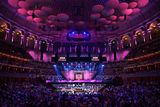Classical: Memorable day I almost took up the baton and conducted
Edward Elgar: An old favourite.
The energy of a live performance is one of the great delights of the musical experience. I've never actually conducted an orchestra, but I did enjoy the next best thing.
One Saturday morning the RTÉ National Symphony played live on "The Hamilton Scores". After two hours in my little den where the music is on tap, I crossed the basement corridor in the Radio Centre and entered the vast acreage of Studio One to spend sixty minutes in the finest of company.
I'd a little perch beside the rostrum where I would say my few words, and then I'd get back on my high stool as Gavin Moloney raised his baton.
Being that close, right there beside the conductor, there was an awesome sensation of the power of the performance. Favourites like Elgar's 'Salut d'amour' and Offenbach's 'Barcarolle' took on new life, the emotional depth of the music brought into stunning relief.
When it came to the mighty Toreador song from Bizet's 'Carmen', the passion in the playing was breathtaking.
All of it has added a whole new dimension to the excitement of Friday evenings in the National Concert Hall where the orchestra is in regular action.
At the other end of the ensemble spectrum, there's the string quartet. No less dynamic, but on a more intimate scale, the four-piece - usually two violins, a viola, and a cello - tends to be much more of a musical conversation. It's what you'd expect in a drawing room.
Out of such innocent beginnings, chamber music - and string quartets in particular - has earned a place as a powerful medium for personal expression, not to mention demonstrations of musical wit.
Unlike the orchestra, there's no conductor, and though it might seem obvious that the first violinist would take the lead, and this does happen, it isn't always the way.
The performance of a string quartet can be based on a more collaborative process, and when this is the case, the players will take their cues from each other in a very democratic kind of music-making, a collective in action.
String quartets have featured in the repertoire of composers famous and less well-known. Haydn, deemed to be the father of the symphony, may well have been the father of the string quartet as well. Mozart followed, and between them they provided some of the finest examples in the category.
There's a set of sixteen by Beethoven, and Schubert excelled in writing for the four-piece ensemble. His quartet numbered 14 - 'Death and the Maiden' - is reckoned to be one of the finest. Schubert was dying when he wrote it, and the music reflects the mood.
Mendelssohn and Brahms were also exponents of the string quartet, and it's a form that's found favour with 20th century composers as well, from Bax and Berg to Shostakovich and Prokofiev.
Which brings us back to where we started, for one of the most loved pieces from the last hundred years - Samuel Barber's 'Adagio for Strings' - is in fact a full orchestration of his String Quartet No. 1 in B minor.
George Hamilton presents The Hamilton Scores on RTÉ Lyric FM from 10.00 each Saturday morning.
Join the Irish Independent WhatsApp channel
Stay up to date with all the latest news














